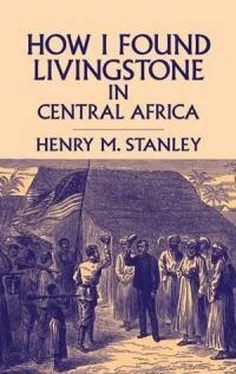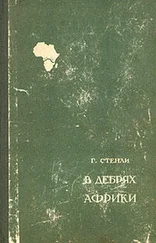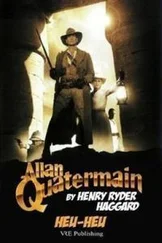Генри Стенли - How I Found Livingstone
Здесь есть возможность читать онлайн «Генри Стенли - How I Found Livingstone» весь текст электронной книги совершенно бесплатно (целиком полную версию без сокращений). В некоторых случаях можно слушать аудио, скачать через торрент в формате fb2 и присутствует краткое содержание. Год выпуска: 1872, Жанр: Биографии и Мемуары, на английском языке. Описание произведения, (предисловие) а так же отзывы посетителей доступны на портале библиотеки ЛибКат.
- Название:How I Found Livingstone
- Автор:
- Жанр:
- Год:1872
- ISBN:нет данных
- Рейтинг книги:5 / 5. Голосов: 1
-
Избранное:Добавить в избранное
- Отзывы:
-
Ваша оценка:
- 100
- 1
- 2
- 3
- 4
- 5
How I Found Livingstone: краткое содержание, описание и аннотация
Предлагаем к чтению аннотацию, описание, краткое содержание или предисловие (зависит от того, что написал сам автор книги «How I Found Livingstone»). Если вы не нашли необходимую информацию о книге — напишите в комментариях, мы постараемся отыскать её.
How I Found Livingstone — читать онлайн бесплатно полную книгу (весь текст) целиком
Ниже представлен текст книги, разбитый по страницам. Система сохранения места последней прочитанной страницы, позволяет с удобством читать онлайн бесплатно книгу «How I Found Livingstone», без необходимости каждый раз заново искать на чём Вы остановились. Поставьте закладку, и сможете в любой момент перейти на страницу, на которой закончили чтение.
Интервал:
Закладка:
We were seated; Ludha Damji, the Banyan collector of customs, a venerable-looking old man, with a shrewd intelligent face, sat on the right of the Sultan; next to him was the great Mohammedan merchant Tarya Topan who had come to be present at the interview, not only because he was one of the councillors of His Highness, but because he also took a lively interest in this American Expedition. Opposite to Ludha sat Capt. Webb, and next to him I was seated, opposite Tarya Topan. The Sultan sat in a gilt chair between the Americans and the councillors. Johari the dragoman stood humbly before the Sultan, expectant and ready to interpret what we had to communicate to the Prince.
The Sultan, so far as dress goes, might be taken for a Mingrelian gentleman, excepting, indeed, for the turban, whose ample folds in alternate colours of red, yellow, brown, and white, encircled his head. His long robe was of dark cloth, cinctured round the waist with his rich sword-belt, from which was suspended a gold-hilted scimitar, encased in a scabbard also enriched with gold: His legs and feet were bare, and had a ponderous look about them, since he suffered from that strange curse of Zanzibar-elephantiasis. His feet were slipped into a pair of watta (Arabic for slippers), with thick soles and a strong leathern band over the instep. His light complexion and his correct features, which are intelligent and regular, bespeak the Arab patrician. They indicate, however, nothing except his high descent and blood; no traits of character are visible unless there is just a trace of amiability, and perfect contentment with himself and all around.
Such is Prince, or Seyd Burghash, Sultan of Zanzibar and Pemba, and the East coast of Africa, from Somali Land to the Mozambique, as he appeared to me.
Coffee was served in cups supported by golden finjans, also some cocoa-nut milk, and rich sweet sherbet.
The conversation began with the question addressed to the Consul.
"Are you well?"
Consul. — " Yes, thank you. How is His Highness?"
Highness. — "Quite well!"
Highness to me. — "Are you well?"
Answer. — "Quite well, thanks!"
The Consul now introduces business; and questions about my travels follow from His Highness-
"How do you like Persia?"
"Have you seen Kerbela, Bagdad, Masr, Stamboul?"
"Have the Turks many soldiers?"
"How many has Persia?"
"Is Persia fertile?"
"How do you like Zanzibar?"
Having answered each question to his Highness' satisfaction, he handed me letters of introduction to his officers at Bagamoyo and Kaole, and a general introductory letter to all Arab merchants whom I might meet on the road, and concluded his remarks to me, with the expressed hope, that on whatever mission I was bound, I should be perfectly successful.
We bowed ourselves out of his presence in much the same manner that we had bowed ourselves in, he accompanying us to the great entrance door.
Mr. Goodhue of Salem, an American merchant long resident in Zanzibar, presented me, as I gave him my adieu, with a blooded bay horse, imported from the Cape of Good Hope, and worth, at least at Zanzibar, $500.
Feb. 4.-By the 4th of February, twenty-eight days from the date of my arrival at Zanzibar, the organization and equipment of the "`New York Herald' Expedition" was complete; tents and saddles had been manufactured, boats and sails were ready. The donkeys brayed, and the horses neighed impatiently for the road.
Etiquette demanded that I should once more present my card to the European and American Consuls at Zanzibar, and the word "farewell" was said to everybody.
On the fifth day, four dhows were anchored before the American Consulate. Into one were lifted the two horses, into two others the donkeys, into the fourth, the largest, the black escort, and bulky moneys of the Expedition.
A little before noon we set sail. The American flag, a present to the Expedition by that kind-hearted lady, Mrs. Webb, was raised to the mast-head; the Consul, his lady, and exuberant little children, Mary and Charley, were on the housetop waving the starry banner, hats, and handkerchiefs, a token of farewell to me and mine. Happy people, and good! may their course and ours be prosperous, and may God's blessing rest on us all!
CHAPTER IV
LIFE AT BAGAMOYO.
The isle of Zanzibar with its groves of cocoa-nut, mango, clove, and cinnamon, and its sentinel islets of Chumbi and French, with its whitewashed city and jack-fruit odor, with its harbor and ships that tread the deep, faded slowly from view, and looking westward, the African continent rose, a similar bank of green verdure to that which had just receded till it was a mere sinuous line above the horizon, looming in a northerly direction to the sublimity of a mountain chain. The distance across from Zanzibar to Bagamoyo may be about twenty-five miles, yet it took the dull and lazy dhows ten hours before they dropped anchor on the top of the coral reef plainly visible a few feet below the surface of the water, within a hundred yards of the beach.
The newly-enlisted soldiers, fond of noise and excitement, discharged repeated salvos by way of a salute to the mixed crowd of Arabs, Banyans, and Wasawahili, who stood on the beach to receive the Musungu (white man), which they did with a general stare and a chorus of "Yambo, bana?" (how are you, master?)
In our own land the meeting with a large crowd is rather a tedious operation, as our independent citizens insist on an interlacing of fingers, and a vigorous shaking thereof before their pride is satisfied, and the peaceful manifestation endorsed; but on this beach, well lined with spectators, a response of "Yambo, bana!" sufficed, except with one who of all there was acknowledged the greatest, and who, claiming, like all great men, individual attention, came forward to exchange another "Yambo!" on his own behalf, and to shake hands. This personage with a long trailing turban, was Jemadar Esau, commander of the Zanzibar force of soldiers, police, or Baluch gendarmes stationed at Bagamoyo. He had accompanied Speke and Grant a good distance into the interior, and they had rewarded him liberally. He took upon himself the responsibility of assisting in the debarkation of the Expedition, and unworthy as was his appearance, disgraceful as he was in his filth, I here commend him for his influence over the rabble to all future East African travellers.
Foremost among those who welcomed us was a Father of the Society of St.-Esprit, who with other Jesuits, under Father Superior Horner, have established a missionary post of considerable influence and merit at Bagamoyo. We were invited to partake of the hospitality of the Mission, to take our meals there, and, should we desire it, to pitch our camp on their grounds. But however strong the geniality of the welcome and sincere the heartiness of the invitation, I am one of those who prefer independence to dependence if it is possible. Besides, my sense of the obligation between host and guest had just had a fine edge put upon it by the delicate forbearance of my kind host at Zanzibar, who had betrayed no sign of impatience at the trouble I was only too conscious of having caused him. I therefore informed the hospitable Padre, that only for one night could I suffer myself to be enticed from my camp.
I selected a house near the western outskirts of the town, where there is a large open square through which the road from Unyanyembe enters. Had I been at Bagamoyo a month, I could not have bettered my location. My tents were pitched fronting the tembe (house) I had chosen, enclosing a small square, where business could be transacted, bales looked over, examined, and marked, free from the intrusion of curious sightseers. After driving the twenty-seven animals of the Expedition into the enclosure in the rear of the house, storing the bales of goods, and placing a cordon of soldiers round, I proceeded to the Jesuit Mission, to a late dinner, being tired and ravenous, leaving the newly-formed camp in charge of the white men and Capt. Bombay.
Читать дальшеИнтервал:
Закладка:
Похожие книги на «How I Found Livingstone»
Представляем Вашему вниманию похожие книги на «How I Found Livingstone» списком для выбора. Мы отобрали схожую по названию и смыслу литературу в надежде предоставить читателям больше вариантов отыскать новые, интересные, ещё непрочитанные произведения.
Обсуждение, отзывы о книге «How I Found Livingstone» и просто собственные мнения читателей. Оставьте ваши комментарии, напишите, что Вы думаете о произведении, его смысле или главных героях. Укажите что конкретно понравилось, а что нет, и почему Вы так считаете.












